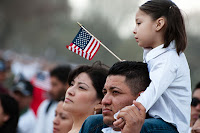--Jay Cost Weekly Standard
There is a hullaballoo surrounding the immigration legislation debate, and it revolves around race and elections. We earlier discussed the white vote’s impact on the 2012 elections. Regarding whites v. minorities, conservative numbers guy Sean Trende recently wrote:
in November 2010, Democrats won only 38% of the white vote. . . it was probably the worst showing among whites, at least as presently defined, for any major party dating back to 1822. Two years later, in a more favorable environment, Democrats still managed only 40% of the white vote.
To win in 2012, the GOP could have tried to improve its share of this Hispanic vote by 21 points. But we have to understand that the same result [could have been] achieved if the Democratic share of the white vote [had declined a] further . . . 3 points. . . The Democrats are reaping the benefits of our increased diversity. But they’re paying it back with an increasingly poor showing among whites.My experience in Hawaii, America’s most nonwhite state, along with what I know about California’s turn from a swing state to heavily Democratic from 1992 onward as whites declined proportionally into minority status, tells me race is highly significant in determining voting patterns. Republicans at their peril ignore this reality, as they seem to have done in 2012. The most important fact about Obama is that he is America’s first non-white president. And it’s why Obama did so overwhelmingly well among minority voters.
How well? According to a Census report, flawed because people self-reporting tend to overstate their participation in past elections, 66.2% of eligible blacks voted in the 2012 election, compared with 64.1% of eligible non-Hispanic whites. Those figures would indicate an estimated two million fewer white Americans voted in 2012 than in 2008, just as about 1.8 million more blacks went to the polls, and exit polls showed more than 90% of them voting to re-elect Obama.
Sarah Wheaton, the New York Times reporter who provided the above facts, quoted Michael Blake, who ran "Operation Vote," the Obama campaign’s effort to reach out to black and minority voters. Blake said, “In 2008, we changed the guard. In 2012, we guard the change.”
According to Wheaton, the overall turnout rate nationwide was 61.8% in 2012, down from 63.6% four years earlier. In 2012, 73.7% of voters were white, Blacks 13.4%, Hispanics 8.4%, Asians 2.9%. Women voted at a rate 4% higher than men. Among blacks, the gap was 9%. The Census report, linked to the article, gave the Hispanic vote turnout at 48.0% (down from 49.9% in 2008), and the Asian vote turnout as 47.3% (down from 47.6%).
As long as politics remains racial, Republicans are in trouble. Their image as the white party is firmly set and based upon a racial divide that worked well for the GOP from 1968 through 2004. Life for every minority person in the U.S. is harder, in ways only minorities appreciate. In any national contest between white male Republicans and a minority or female Democrat, minorities will tend, I believe, to side with the Democrat.
Maybe a white only strategy can work in 2014 or even 2016. But Republicans would be smarter to pull Hispanic and Asian votes away from Democrats by nominating a minority candidate and supporting real immigration reform, while remaining true to their philosophy advocating smaller, more efficient government.



No comments:
Post a Comment